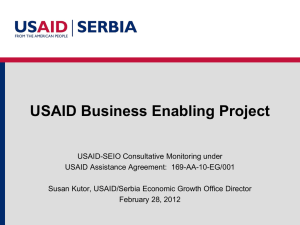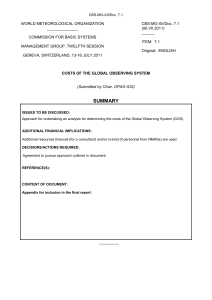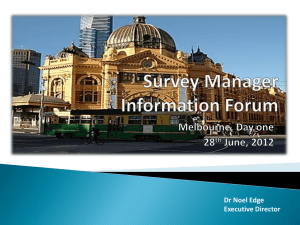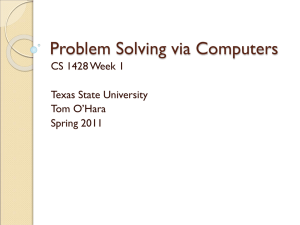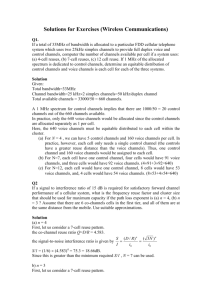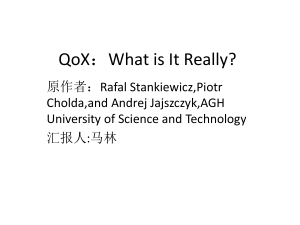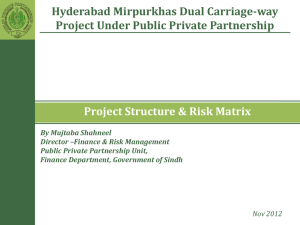UES 2013 Institution Administration Guide
advertisement
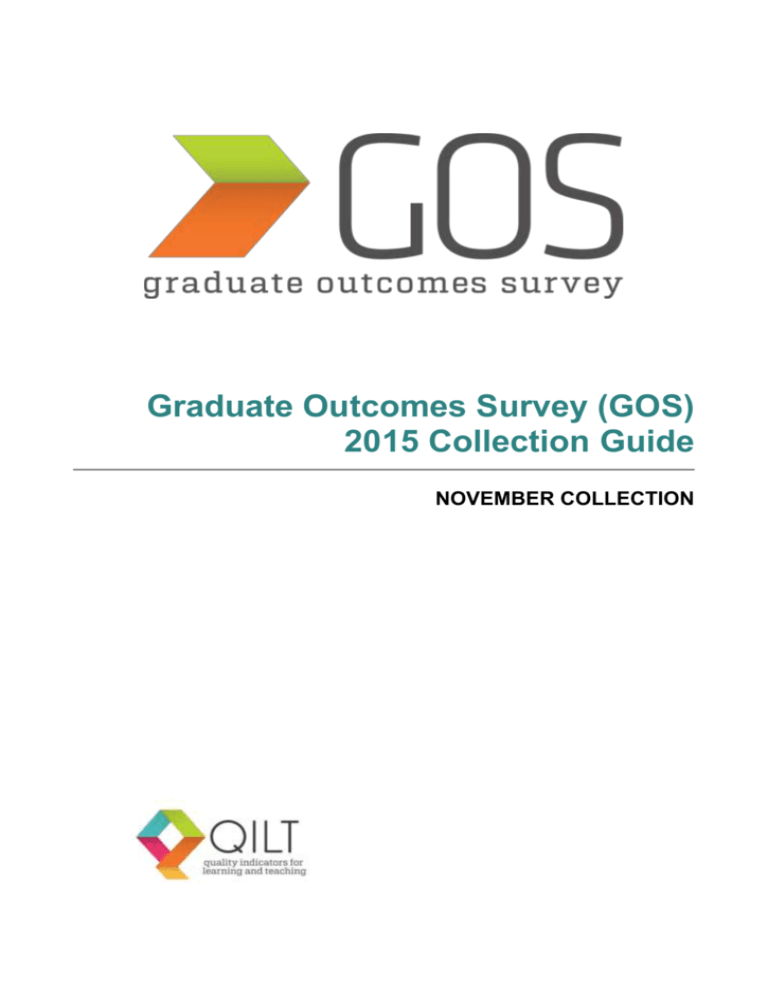
Graduate Outcomes Survey (GOS) 2015 Collection Guide NOVEMBER COLLECTION 2015 GOS Collection Guide Contents List of abbreviations .................................................................................................................... iii 1. Introduction .......................................................................................................................... 4 Overview of the GOS ............................................................................................... 4 The standard GOS instrument.................................................................................. 4 Administration Schedule........................................................................................... 5 GOS Support ........................................................................................................... 5 2. Preparing for the GOS ......................................................................................................... 6 Participation in the GOS ........................................................................................... 6 Privacy ..................................................................................................................... 6 Adding additional questions...................................................................................... 6 Telephone Non-Response follow-up ........................................................................ 7 3. Student Engagement ........................................................................................................... 8 Guide to marketing the GOS .................................................................................... 8 Engagement activity plan ......................................................................................... 8 Social Media campaign .......................................................................................... 11 Institutional web presence ...................................................................................... 11 Incentivisation ........................................................................................................ 11 4. Response maximisation .................................................................................................... 13 Email invitations and reminders .............................................................................. 13 Hardcopy non-response letter ................................................................................ 14 5. During the GOS .................................................................................................................. 16 Liaison ................................................................................................................... 16 Real time reporting ................................................................................................. 16 6. Final Reports ...................................................................................................................... 17 Datafiles ................................................................................................................. 17 Institutional reports ................................................................................................. 17 National Report ...................................................................................................... 17 APPENDIX A: Social Research Centre Deed of Confidentiality ............................................... 18 APPENDIX B: Deed of Confidentiality between the SRC and Valiant Press ........................... 20 APPENDIX C: Australian Government Department of Education Subject areas by field of education............................................................................................................................ 22 The Social Research Centre – September 2015 page ii 2015 GOS Collection Guide List of abbreviations AAIR Australasian Association for Institutional Research ABS Australian Bureau of Statistics ACARA Australian Curriculum and Assessment Reporting Authority ACER Australian Council for Educational Research AGS Australian Graduate Survey AMSRS Australian Market and Social Research Society BGS Beyond Graduation Survey CATI Computer Assisted Telephone Interviewing CEQ Course Experience Questionnaire CHESSN Commonwealth Higher Education Student Support Number ESS Employer Satisfaction Survey DEEWR Department of Education, Employment and Workplace Relations GCA Graduate Careers Australia GCA-SRC Graduate Careers Australia- Social Research Centre Consortium GDS Graduate Destination Survey GO Graduate Opportunities GOS Graduate Outcomes Survey HEIMS Higher Education Information Management System ISO International Standards Organisation NHMRC National Health and Medical Research Council OTS On Track Survey PAL Primary Approach Letters PREQ Postgraduate Research Experience Questionnaire PAG Project Advisory Group QA Quality Assurance SOS Student Outcomes Survey SRC Social Research Centre SRG Survey Reference Group TSE Total Survey Error U&B University and Beyond Survey UA Universities Australia UEQ University Experience Questionnaire UES University Experience Survey VC Vice-Chancellor The Social Research Centre – September 2015 page iii 2015 GOS Collection Guide 1. Introduction Overview of the GOS The focus of the Graduate Outcomes Survey (GOS) is on understanding the labour force outcomes of recent graduates. The GOS replaces the Australian Graduates Survey (AGS), with participation extending from Table A and Table B universities to include non-university higher education institutions from 2015. The survey has been designed to provide reliable, valid and generalisable information on graduate outcomes to the Australian Government and to higher education providers. The GOS is administered under the Quality Indicators for Learning and Teaching (QILT) survey suite, commissioned by the Australian Department of Education and Training. The Social Research Centre is working with higher education providers and key stakeholders to administer the GOS. Similar to the AGS, the GOS will run over two collection cycles (November and May), with January to June completers surveyed in November of the same year, and July to December completers surveyed in May of the following year. Reporting is aggregated over the two surveys and completed after the May cycle. This document is aimed to be a user friendly collection guide to the November 2015 GOS. The standard GOS instrument The core GOS focuses on measuring the following: Labour force outcomes, Further study, Graduate attributes (including CEQ/PREQ), Graduate preparation, and Recruitment for the ESS. There are some differences in the way labour force outcomes are captured compared to the AGS, with the labour force module in the GOS closely aligned to the Australian Bureau of Statistics Labour Force Survey. During this transition year, the GOS will also collect data for the CEQ/PREQ and the new Graduate Attributes Scale in parallel to allow institutions one round to adapt their internal reporting requirements. The GOS instrument will include the following 4 CEQ scales, administered to all in scope completers from each institution: Good Teaching Scale (GTS, 6 items) Graduate Qualities Scale (GQS, 6 items) 2015 GOS Collection Guide Generic Skills Scale (GSS, 6 items) Overall Satisfaction Item (OSI, 1 item) As per the AGS, the instrument will collect data relating to each course element if the student is enrolled in a combined or double degree. Each institution will be provided with a test link to their survey. The SRC will only require sign off if additional questions have been added. Administration Schedule The schedule for the November 2015 GOS is shown below at Table 1. The schedule is based on the best estimates we can make at the time of writing, and are vulnerable to change, subject to external delays. All institutions will receive an interim data file early in 2016, however this will not be publishable data, and we advise institutions against using the data for any reporting purposes. Final institution reports and data outputs will not be available until after the completion of the May 2016 GOS cycle. Table 1. GOS 2015 Administration Schedule Date Key milestones Additional questions confirmed by institutions 2 Oct 15 Additional questions scripted and provided to institutions 13 Oct 15 Additional questions signed off 16 Oct 15 Telephone follow up confirmed by institutions 16 Oct 15 Online fieldwork 2 - 30 Nov 15 Interim institutional data outputs 2016 Final institutional reports and data outputs 2016 GOS Support General enquiries and all queries relating to sampling and sample files, file formats, any questions or feedback on the instrument, should be directed to the Social Research Centre’s QILT Team. The team can be contacted on (03) 9236 8530 or (03) 9236 8521 or by emailing qilt@srcentre.com.au. We will endeavour to get back to you within 24 hours – even if only to acknowledge receipt of your communication. The Social Research Centre – September 2015 page 5 2015 GOS Collection Guide 2. Preparing for the GOS Participation in the GOS Institutions have consented to participate in the GOS through communications with the QILT team at the Social Research Centre. Consent is stored securely on a database of QILT contacts. You may request the information that the Social Research Centre holds about your institution in the QILT database by contacting the QILT team. Privacy In previous years privacy concerns were cited as a barrier to releasing personal information to third party providers for the purposes of undertaking data collection for the GOS. All Social Research Centre staff involved in the November 2015 GOS (including helpline operators) have entered into a project-specific Deed of Confidentiality. The SRC also have in place a Deed of Confidentially with the mailing house to which the data supplied by institutions will be sent, and which will use the same security controls that they have in place for the printing and distribution of the NAPLAN booklets, which includes the destruction of all personal data as soon as the letters have been printed (see Appendix B). The only data released to the Social Research Centre will be the student’s email address, the stratification variables and any additional, non-identifying administrative data required for operational or analytic purposes. The GOS is conducted within the ethical guidelines laid out in the Australian Code for the Responsible Conduct of Research1. All data collection for the November 2015 GOS will be undertaken in accordance with ISO 20252 standards, the AMSRS code of practice, the Market and Social Research Privacy Principles, and the Australian Privacy Act. The Social Research Centre will also enter into a Deed of Confidentiality with institutions as required (see Appendix A). Adding additional questions The November 2015 GOS provides institutions with the opportunity to include nonstandard, institutional specific questions towards the end of the instrument. All questions need to be reviewed, and their inclusion to the instrument will incur an extra fee. This fee will be calculated on an individual basis depending on the requirements of the institution. 1 National Health and Medical Research Council and Universities Australia, 2007, www.nhmrc.gov.au/index.htm. The Social Research Centre – September 2015 page 6 2015 GOS Collection Guide The final date for communications regarding the addition of extra questions is Friday October 02, 2015. Programmed additional questions will be available to test from Tuesday October 13 with institutions providing sign-off by Friday October 16, 2015. Telephone Non-Response follow-up The November 2015 GOS offers optional telephone non-response follow-up using the Social Research Centre’s in-house call centre. Telephone follow up will take place after online collection has closed. The SRC is offering two types of telephone follow up; full telephone survey or a telephone reminder call. The reminder call is designed to drive graduates to the online survey, to maintain methodological consistency, while the full telephone survey is completed over the phone at the time of call. The Social Research Centre can provide a quote for telephone reminders or full surveys on request. We are only able to accommodate definite bookings, as there are specific sample preparation and scripting processes that start prior to online fieldwork to enable the survey for telephone interviewing. Due to the set-up required, if telephone follow-up is booked and then cancelled there will be a cancellation fee to cover these costs. Given sample preparation requirements, timelines and the high volume of work within the Social Research Centre’s call centre, bookings for telephone survey can only be accommodated up until October 16, 2015. The Social Research Centre – September 2015 page 7 2015 GOS Collection Guide 3. Student Engagement Supporting materials for the range of student engagement initiatives outlined in this section will be made available to survey managers on or before November 30, 2015. Guide to marketing the GOS This section is focussed on the effective and appropriate usage of GOS branded marketing materials. The objective is to raise awareness of the GOS and facilitate survey participation. Based on our experiences with student surveys we aim to use a set of established strategies that are proven to support solid response rates from students and graduates including letters, emails, and an appropriate incentive program. These strategies are best when supported by institution-based promotion as well as an innovative social media campaign. Please refer to section 3.2 for the Engagement Activity Plan which outlines key dates and materials to use throughout the fieldwork period. There are three distinct time periods that dictate the use of assets: Pre-survey awareness, October 26 – November 1 GOS now open messaging, November 2 – 22 Last chance to complete the GOS, November 23 – 30 These engagement materials will be distributed to institutions and will include: Web tiles: Multiple sizes of web tiles (MREC, Leaderboard, Skyscraper) featuring GOS branding and messaging. There are three different executions designed to correspond with the three time periods outlined above. Facebook posts: artwork and copy are available to be shared on institutional pages. There is a series of three posts promoting awareness during the pre-survey awareness time period, followed by four posts while the survey is open, and one final post during the last week of field. Digital posters: There are three slides, each containing messaging relevant to the three time periods above. Engagement activity plan The Social Research Centre has created a best-practice engagement activity plan based on the effectiveness of structured and well-timed engagement during several trial QILT projects and the 2015 SES. Institutions will be asked to adhere to the activity plan below. Variations to the activities outlined in the GOS Engagement Activity Plan are only permitted upon agreement with the Social Research Centre. Proposed additions to engagement activity plans are to be submitted by Friday October 23 2015. The Social Research Centre – September 2015 page 8 2015 GOS Collection Guide Table 2. November 2015 GOS Engagement Activity Plan How institutions can help to maximise response rates Email activity conducted by the Social Research Centre In the lead-up to the launch: October 26th – October 30th – Awareness Campaign Create a web presence for GOS on institutional website under ‘current surveys’ or similar. (Refer to Section 3.4); Send an email to staff alerting to GOS participation and encourage use of in-class slides for first year post graduate classes (Refer to GOS to Staff email and Awareness, Open and Closing slides) Send an email from the Vice Chancellor to graduates advising of the GOS. (Refer to GOS to graduates email); Use your institution’s Social Media platforms to promote the survey (e.g., Facebook, Twitter). (Refer to Awareness Facebook Post and GOS Facebook Copy Text); Upload online posters to your institution’s alumni page or website for the duration of the fieldwork period (Refer to Awareness Webtiles); Advertise the GOS in alumni newsletters (or similar) (Refer to Awareness Posters, Webtiles, or Slides); Ensure whitelisting strategies are put in place (Refer to Section 4.1.1) Online survey launch: Week commencing 2nd November – Open Campaign Monday 2nd November Email invitation will be sent to all students sampled for inclusion in the GOS Use your institution’s Social Media platforms to promote the survey (e.g., Facebook, Twitter) (Refer to Open Facebook Post and GOS Facebook Copy Text) Post an announcement on your institution’s alumni page or website (Refer to Open Webtiles) Thursday 5th November SRC Reminder email #1 The Social Research Centre – September 2015 page 9 2015 GOS Collection Guide How institutions can help to maximise response rates Email activity conducted by the Social Research Centre Week commencing Monday 9th November – Open Campaign Post a reminder on your institution’s alumni page or website (Refer to Open Webtiles); Use your institution’s Social Media platforms to promote the survey (e.g., Facebook, Twitter) (Refer to Open Facebook Post and GOS Facebook Copy Text) Tuesday 10th November SRC Reminder email #2 Saturday 14th November SRC Reminder email #3: Week commencing Monday 16th November – Open Campaign Tuesday 17th November Use your institution’s Social Media platforms to promote the survey (e.g., Facebook, Twitter, LinkedIn) (Refer to Open Facebook Post and GOS Facebook Copy Text) SRC Reminder email #4: Saturday 21st November SRC Reminder email #5: Week commencing Monday 23rd November – Closing Campaign Use your institution’s Social Media platforms to promote the survey (e.g., Facebook, Twitter) (Refer to Closing Facebook Post and GOS Facebook Copy Text) Post a reminder on your alumni page or website (Refer to Closing Webtiles or Slides) Tuesday 24th November SRC Reminder email #6: Saturday 28th November SRC Reminder email #7: The Social Research Centre – September 2015 page 10 2015 GOS Collection Guide Social Media campaign Social media campaigns will be conducted through the QILT Facebook page and will be managed by the Social Research Centre. Survey Managers are encouraged to post updates of survey progress on the QILT Facebook page. Institutional web presence The SRC recommends creating or updating a web presence for the November 2015 GOS to impart legitimacy to the survey, as well as provide a reference point for graduates to access general information about the GOS. Please use the logo provided in the collection pack provided. For general information please include a link to one http://www.qilt.edu.au/surveys/gos on your website. Incentivisation All completing graduates will be entered into a rolling prize draw in the November 2015 GOS. The prize pool will total $32,000, comprised of four weekly prize pools of $8,000. Each weekly prize pool will be made up of three $1,000, five $500 and ten $250 prepaid VISA gift cards. The $1,000 gift cards will be drawn on a national basis, however the remaining prizes will be distributed between the states based on the proportion of institutions located within each state. The prize pool is designed to encourage early completion, as early completers are entered into all remaining prize draws from the date of their survey submission. All conduct related to the prize draw including permits, drawing of prizes, contacting winners, and advertising of winners will be carried out by the Social Research Centre. The terms and conditions of the prize pool will be available at http://www.srcentre.com.au/gostcs. The link to the terms and conditions will be inserted into email activity sent to students and can be included on a webpage presence as outlined in Section 4.4. The key prize draw dates are available in Table 3. The Social Research Centre – September 2015 page 11 2015 GOS Collection Guide Table 3: Prize draw key dates Activity Date Prize draw period opens/Fieldwork starts 2 Nov Prize draw 1 close 8 Nov Prize draw conducted 9 Nov Prize draw 2 close 15 Nov Prize draw conducted 16 Nov Prize draw 3 close 22 Nov Prize draw conducted 23 Nov Prize draw 4 close 29 Nov Prize draw period closes/Online collection closes 30 Nov Prize draw conducted 30 Nov The Social Research Centre – September 2015 page 12 2015 GOS Collection Guide 4. Response maximisation Student engagement activities such as marketing materials, media campaigns and incentives heavily support response maximisation, which is carried out through email invitation and reminders and a hardcopy non-response letter. Email invitations and reminders All institutions will follow the same fieldwork period for the November 2015 GOS; as such the reminder schedule will be uniform across all institutions. Prior to each communication the Social Research Centre will remove students who have completed the survey or opted out of further follow up from email communications. Email reminders will be tailored according to progress within study areas, as well as graduates’ response status (whether they have started the survey or not). The reminder schedule is based on sound operational experience, and has been used across various trial surveys, as well as the SES with great success. Given that centralisation of data collection for the GOS is designed to provide more robust, consistent and comparable data, the methodology cannot be altered without impacting on comparability. Requests to modify the email schedule cannot be accommodated at this stage. The email schedule is outlined below in Table 4. Table 4. November 2015 GOS Response Maximisation Activities Activity Date Fieldwork starts/email invite sent 2 Nov Email reminder 1 preparation and sending 5 Nov Email reminder 2 preparation and sending 10 Nov Email reminder 3 preparation and sending 14 Nov Email reminder 4 preparation and sending 17 Nov Email reminder 5 preparation and sending 21 Nov Email reminder 6 preparation and sending 24 Nov Email reminder 7 preparation and sending 28 Nov Online collection closes 30 Nov 2015 GOS Collection Guide 4.1.1. Whitelisting and spam mitigation All conduct related to email contact and follow up with students will be carried out by the Social Research Centre using an internal email platform. To ensure that all email correspondence has the best possible chance of being received by students, the Social Research Centre is advising all institutions, to follow whitelisting processes as outlined below: ‘Whitelist’ emails from the following domain: srcentre.com.au It can also help to whitelist the actual email address: gos@srcentre.com.au ‘Whitelist’ IP address ranges that GOS emails will be sent from: o 203.145.62.224/27 o 203.145.63.0/26 o 203.145.63.64/27 o 113.192.59.0/27 Other useful information: o The return-path is mbounces.com o All mail originates from a server with a hostname that ends in ‘emdbms.com’ Email subject headings2: o ‘Graduate Outcomes Survey [GOS] Invitation’ o ‘Graduate Outcomes Survey [GOS] – Complete now for more chances win!’ o ‘Graduate Outcomes Survey [GOS] – Reminder to complete’ o ‘Graduate Outcomes Survey [GOS] – Tell us about your <course> and win great prizes’ o ‘‘Graduate Outcomes Survey [GOS] – Where are you now?’ o ‘Graduate Outcomes Survey [GOS] – Closing soon’ o ‘Graduate Outcomes Survey [GOS] – Last chance to have your say!’ Hardcopy non-response letter • Following the email invitation on November 2, the remaining in-scope population that have not responded by either completing or opting out of the GOS will receive a hardcopy non- 2 The Social Research Centre may vary subject headings slightly depending on needs arising during fieldwork. The Social Research Centre – September 2015 page 14 2015 GOS Collection Guide response letter. Letters will be sent between November 4 and November 6 and are expected to arrive between November 5 and November 13 depending upon address of graduates and Australia Post delivery times. Out-of-scope additional populations will only receive a hardcopy letter if this was quoted on and approved by the inquiring institution. The Social Research Centre – September 2015 page 15 2015 GOS Collection Guide 5. During the GOS Liaison Throughout the November 2015 GOS, the Social Research Centre team will aim for a transparent and collaborative process. Communications will be delivered on a one-on-one basis and via the QILT newsletter, depending upon individual needs. Real time reporting The Social Research Centre is able to offer participating institutions real time status reporting for the November 2015 GOS, meaning that, once fieldwork commences, institutions can monitor the progress of data collection, and readily engage in a discussion with the Social Research Centre project management team regarding targeted nonresponse follow up activities, as appropriate. The standard reporting link for the online survey features: A summary of progress towards the specified target in table format, by agreed variables – for the GOS, this would be study area, gender, qualification, and CEQ/PREQ; The capacity to download a csv file of completed surveys and analyse by course code, Field of Education, study area and gender, providing the flexibility to create tables or charts in Excel; The capacity to monitor completion status (completes, partial completes, disqualified) A login will be assigned to your institution when fieldwork starts if your institution is new to QILT for the GOS November 2015 collection. Previously issued logins can be used at https://data.srcentre.com.au/. 2015 GOS Collection Guide 6. Final Reports Datafiles Data can be delivered in one of three formats: SPSS, SAS and csv however institutions are welcome to request other formats if they have specific requirements. Each institution will receive data for their institution, including any additional questions or populations that they may have requested. Under Quality Indicators for Learning and Teaching (QILT) the national data file is provided free of charge. University Australia data sharing agreements are still applicable under QILT. Institutional reports Participating institutions in the November 2015 GOS will receive an institutional report after the completion of the May 2016 GOS cycle. The content will include: An overview of the GOS, including a brief explanation of the survey methodology, response, psychometric properties, etc.; Institutional GOS results stratified on the basis of key demographic and contextual groups; and Appropriate benchmark results (e.g. national, higher education group) to provide context to the institutional results. National Report The National GOS Report will be released in the second half of 2016 and will include: An executive summary; An overview of the project and relevant contexts; An overview of the methodology, including the study design, non-response treatment, psychometric properties of the instrument, and analysis techniques; Key findings for key analysis groups and identification of issues and sub-groups for further statistical analysis; A detailed discussion of results and any other significant findings emerging from the survey. 2015 GOS Collection Guide APPENDIX A: Social Research Centre Deed of Confidentiality The Social Research Centre – September 2015 page 18 2015 GOS Collection Guide If you are unable to retrieve this embedded attachment please go to http://www.srcentre.com.au/QILT-resources The Social Research Centre – September 2015 page 19 2015 GOS Collection Guide APPENDIX B: Deed of Confidentiality between the SRC and Valiant Press The Social Research Centre – September 2015 page 20 2015 GOS Collection Guide CONFIDENTIALITY DEED FOR SRC.pdf The Social Research Centre – September 2015 page 21 2015 GOS Collection Guide APPENDIX C: Australian Government Department of Education Subject areas by field of education The Social Research Centre – September 2015 page 22 2015 GOS Collection Guide Field of education within subject area 1 Natural & Physical Sciences 010000, 010300, 010301, 010303, 010500, 010501, 010503, 010599, 010700, 010701, 010703, 010705, 010707, 010709, 010711, 010713, 010799, 019900, 019999 2 Mathematics 010100, 010101, 010103, 010199 3 Biological Sciences 010900, 010901, 010903, 010905, 010907, 010909, 010911, 010913, 010915, 010999 4 Medical Sciences & Technology 019901, 019903, 019905, 019907, 019909 5 Computing & Information Systems 020000, 020100, 020101, 020103, 020105, 020107, 020109, 020111, 020113, 020115, 020117, 020119, 020199, 020300, 020301, 020303, 020305, 020307, 020399, 029900, 029901, 029999 6 Engineering – Other 030000, 030100, 030101, 030103, 030105, 030107, 030109, 030111, 030113, 030115, 030117, 030199, 030501, 030503, 030505, 030507, 030509, 030511, 030513, 030515, 030599, 031100, 031101, 031103, 031199, 031701, 031703, 031705, 031799, 039900, 039901, 039903, 039905, 039907, 039909, 039999 7 Engineering – Process & Resources 030300, 030301, 030303, 030305, 030307, 030399 8 Engineering - Mechanical 030700, 030701, 030703, 030705, 030707, 030709, 030711, 030713, 030715, 030717, 030799 9 Engineering – Civil 030900, 030901, 030903, 030905, 030907, 030909, 030911, 030913, 030999 10 Engineering - Electrical & Electronic 031300, 031301, 031303, 031305, 031307, 031309, 031311, 031313, 031315, 031317, 031399 11 Engineering – Aerospace 031500, 031501, 031503, 031505, 031507, 031599 12 Architecture & Urban Environments 040000, 040100, 040101, 040103, 040105, 040107, 040199 13 Building & Construction 040300, 040301, 040303, 040305, 040307, 040309, 040311, 040313, 040315, 040317, 040319, 040321, 040323, 040325, 040327, 040329, 040399 14 Agriculture & Forestry 050000, 050100, 050101, 050103, 050105, 050199, 050300, 050301, 050303, 050500, 050501, 050700, 050701, 050799, 059901, 059999 15 Environmental Studies 050900, 050901, 050999 16 Health Services & Support 060000, 060900, 060901, 060903, 060999, 061500, 061501, 061700, 061705, 061707, 061709, 061711, 061713, 061799, 061900, 061901, 061903, 061905, 061999, 069900, 069901, 069903, 069905, 069907, 069999 17 Public Health 061300, 061301, 061303, 061305, 061307, 061309, 061311, 061399 The Social Research Centre – September 2015 page 23 2015 GOS Collection Guide 18 Medicine 19 060100, 060101, 060103, 060105, 060107, 060109, 060111, 060113, 060115, 060117, 060119, 060199 Nursing 060300, 060301, 060303, 060305, 060307, 060309, 060311, 060313, 060315, 060399 20 Pharmacy 060500, 60501 21 Dentistry 060700, 060701, 060703, 060705, 060799 22 Veterinary Science 061100, 061101, 061103, 061199 23 Physiotherapy 61701 24 Occupational Therapy 61703 25 Teacher Education – Other 070107, 070109, 070111, 070113, 070115, 070117, 070199, 070300, 070301, 070303, 079900, 079999, 070100, 070000 26 Teacher Education - Early Childhood 70101 27 Teacher Education - Primary & Secondary 070103, 070105 28 Accounting 80100, 80101 29 Business Management 080300, 080301, 080303, 080305, 080307, 080309, 080309, 080311, 080313, 080315, 080317, 080319, 080321, 080323, 080399 30 Sales & Marketing 080500, 080501, 080503, 080505, 080507, 080509, 080599 31 Management & Commerce - Other 080000, 080901, 080903, 080905, 080999, 089900, 089901, 089903, 089999 32 Banking & Finance 081100, 081101, 081103, 081105, 081199 33 Political Science 090100, 090101, 090103 34 Humanities inc History & Geography 090000, 090300, 090301, 090303, 090305, 090307, 090309, 090311, 090313, 090399, 091300, 091301, 091303, 091700, 091701, 091703, 099900, 099901, 099903, 099905, 099999 35 Language & Literature 091500, 091501, 091503, 091505, 091507, 091509, 091511, 091513, 091515, 091517, 091519, 091521, 091523, 091599 36 Social Work The Social Research Centre – September 2015 page 24 2015 GOS Collection Guide 090500, 090501, 090503, 090505, 090507, 090509, 090511, 090513, 090515, 090599 37 Psychology 090700, 090701, 090799 38 Law 090900, 090901, 090903, 090905, 090907, 090909, 090911, 090913, 090999 39 Justice Studies & Policing 091100, 091101, 091103, 091105, 091199 40 Economics 091900, 091901, 091903 41 Sport & Recreation 092100, 092101, 092103, 092199 42 Art & Design 100000, 100300,100301, 100303, 100305, 100307, 100309, 100399, 100500, 100501, 100503, 100505, 100599, 109900, 109999 43 Music & Performing Arts 100100, 100101, 100103, 100105, 100199 44 Communication, Media & Journalism 100700, 100701, 100703, 100705, 100707, 100799 45 Tourism, Hospitality & Personal Services 080700, 080701, 110000, 110101, 110103, 110105, 110107, 110109, 110111, 110199, 110301, 110303, 110399, 120000, 120100, 120101, 120103, 120105, 120199, 120301, 120303, 120305, 120399, 120501, 120503, 120505, 120599, 129999 The Social Research Centre – September 2015 page 25
